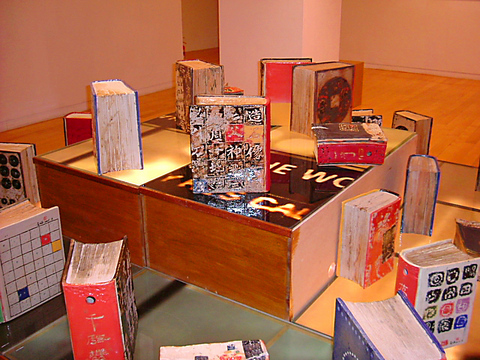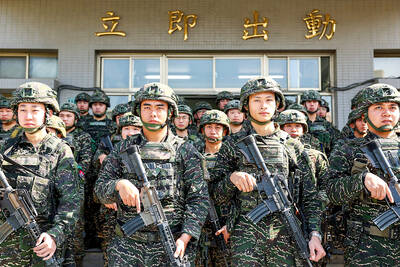In fine arts, discussion of East meets West often arises when the subject turns to contemporary Chinese ink brush painting. One of the foremost authorities on this subject, Liu Kuo-sung (劉國松), is participating in a group exhibition currently on view at the Hong-gah Museum.
Titled Treasured Objects of the Literati , it also features the work of Yuan Chin-taa (
The challenge for today's ink brush artist is to master the traditional technique while keeping the content relevant to today's world. Otherwise, it looks like merely imitating past achievements without offering anything new.

PHOTO: SUSAN KENDZULAK, TAIPEI TIMES
A brief historical note to set this exhibition into context: After the Yuan dynasty (1279 AD to 1368 AD), the literati took on ink painting as a hobby, so that paintings were more written (calligraphic) than painted.
For Taiwanese painters of the 20th century, who felt caught between western modernism with its emphasis on freedom of expression, and the history of Chinese calligraphic painting, there seemed to be a difficulty in choosing which direction to follow.
The Hong-gah exhibition features the above three Taiwanese ink brush painters' most recent works and a ceramics installation by Liu.
Born in China in 1932, Liu led the "Modern Chinese Painting Movement" in the 1950s and he is known for his innovative techniques such as non-brush-and-ink painting.
Yuan Chin-taa (
Like Yuan, many Taiwanese artists make strong political statements in a subtle way. At first glance, the painting looks simply like a painting of many chairs arranged in rows. However, these innocuous objects are imbued with political meaning.
Hung Ken-shan (
The Nanhai Gallery is part of what was the Taipei Teacher's College and which recently changed to the National Taipei University of Education. It's a great little place that captures the energy of a university coffee house where a wide range of cultural activities take place.
The second floor has a small cafe offering soft drinks and beer. Sometimes on weekend nights, musicians gather to play live music, while on weekend afternoons there may be in-depth panel discussions led by arts professors with their young art students.
Ivy Huey (
Exhibition notes:
What: "Treasured Objects of the Literati"
Where: Hong-gah Museum, 5F, 260, Dayeh Road, Qiyen MRT stop, Taipei
Tel: (02) 2894 2272
When: To Oct. 30
What: "The Dress Magician"
Where: Nanhai Gallery, 3, Ln 19, Chongqing S Rd, Sec 2, Taipei
TEL: (02) 2392 5080 When: To Nov. 6

That US assistance was a model for Taiwan’s spectacular development success was early recognized by policymakers and analysts. In a report to the US Congress for the fiscal year 1962, former President John F. Kennedy noted Taiwan’s “rapid economic growth,” was “producing a substantial net gain in living.” Kennedy had a stake in Taiwan’s achievements and the US’ official development assistance (ODA) in general: In September 1961, his entreaty to make the 1960s a “decade of development,” and an accompanying proposal for dedicated legislation to this end, had been formalized by congressional passage of the Foreign Assistance Act. Two

President William Lai’s (賴清德) March 13 national security speech marked a turning point. He signaled that the government was finally getting serious about a whole-of-society approach to defending the nation. The presidential office summarized his speech succinctly: “President Lai introduced 17 major strategies to respond to five major national security and united front threats Taiwan now faces: China’s threat to national sovereignty, its threats from infiltration and espionage activities targeting Taiwan’s military, its threats aimed at obscuring the national identity of the people of Taiwan, its threats from united front infiltration into Taiwanese society through cross-strait exchanges, and its threats from

Despite the intense sunshine, we were hardly breaking a sweat as we cruised along the flat, dedicated bike lane, well protected from the heat by a canopy of trees. The electric assist on the bikes likely made a difference, too. Far removed from the bustle and noise of the Taichung traffic, we admired the serene rural scenery, making our way over rivers, alongside rice paddies and through pear orchards. Our route for the day covered two bike paths that connect in Fengyuan District (豐原) and are best done together. The Hou-Feng Bike Path (后豐鐵馬道) runs southward from Houli District (后里) while the

March 31 to April 6 On May 13, 1950, National Taiwan University Hospital otolaryngologist Su You-peng (蘇友鵬) was summoned to the director’s office. He thought someone had complained about him practicing the violin at night, but when he entered the room, he knew something was terribly wrong. He saw several burly men who appeared to be government secret agents, and three other resident doctors: internist Hsu Chiang (許強), dermatologist Hu Pao-chen (胡寶珍) and ophthalmologist Hu Hsin-lin (胡鑫麟). They were handcuffed, herded onto two jeeps and taken to the Secrecy Bureau (保密局) for questioning. Su was still in his doctor’s robes at